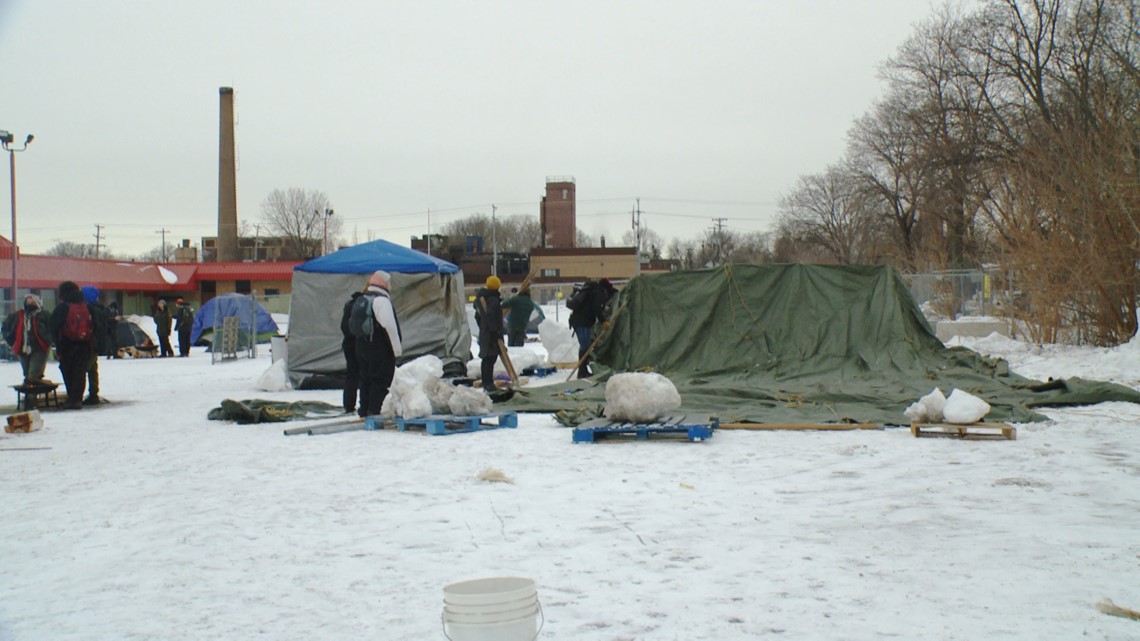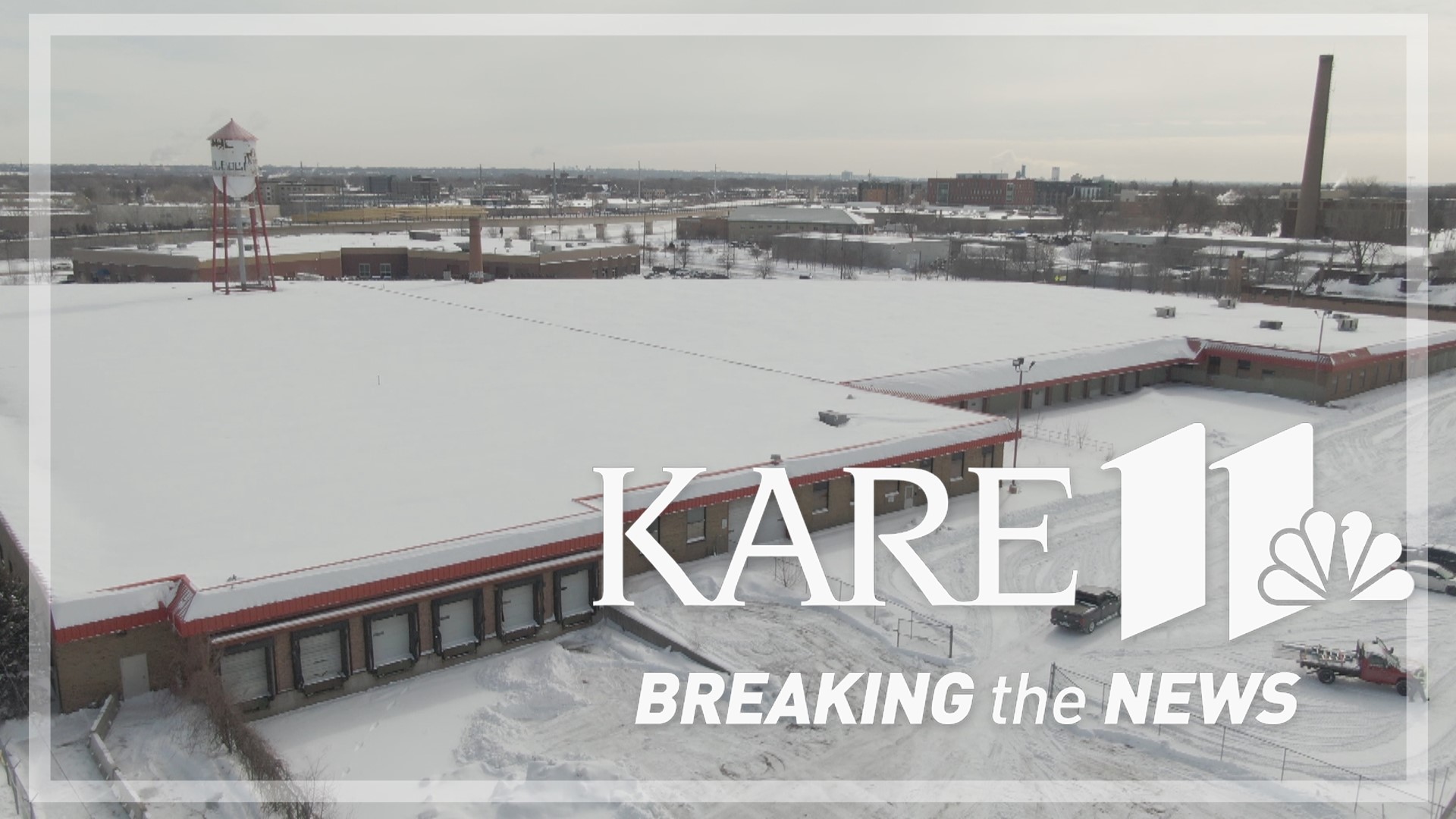MINNEAPOLIS, Minnesota — The Roof Depot site in the East Phillips neighborhood is at the center of a fight between the city of Minneapolis and its residents.
The city plans to demolish the vacant warehouse on the site to make way for a new public works facility. Meanwhile, there is a push in the community to keep the building and transform it into an indoor urban farm.
On Friday morning, Hennepin County District Court Judge Edward Wahl granted a temporary injunction pending appeal. This means the demolition, which was expected to start on Tuesday, is now at least temporarily delayed.
The judge previously had denied East Phillips Neighborhood Institute (EPNI)'s request to stop the demolition, saying, "the Court finds that Plaintiffs have not met their burden of demonstrating that demolition of the Roof Depot site will cause irreparable harm instead of just the potential of harm."
But EPNI filed an appeal to the ruling. The nonprofit went back to Judge Wahl for the temporary injunction while waiting for the Minnesota Court of Appeals to hear their case.
For nearly a decade, EPNI has been fighting with the city to stop the demolition, citing environmental concerns.
The city's plan, called the Hiawatha Campus Expansion project, would demolish the vacant warehouse and make way for a new public works facility — combining three sites into one.
But those against the plan say it will add pollution to an already polluted area.


"What led us to this point was myself and community members tired of our children being sick," said Cassie Holmes, a resident of Little Earth who sits on the EPNI board.
Holmes' son, Trinidad Flores, was diagnosed with a heart condition at 14 years old and died two years later in 2013. Holmes said doctors do not know what caused Flores' heart condition but she believes it was the environment.
"I myself don't want to see another parent bury a child like I had," Holmes said.
Elizabeth Royal, an attorney representing EPNI, said, "This community has been overburdened by toxic pollution. It's one of the most polluted areas in the state."
According to EPNI, the East Phillips neighborhood already has some of the highest rates of asthma, lead poisoning and heart disease in the state based on Minnesota Department of Health data.
According to the city's Racial Equity Impact Analysis, "The data indicates that the residents living in the neighborhoods around the project site, which has a majority of BIPOC residents, experience much higher levels of cumulative pollution than residents from majority white city neighborhoods and the average metro area resident leading to higher levels of asthma and hospitalization for children and adults living in the surrounding neighborhoods."


The land surrounding the warehouse is a former Superfund site. The U.S. Environmental Protection Agency removed 50,000 tons of contaminated soil in the area due to a former pesticide manufacturing plant nearby.
Activists are concerned the demolition could stir up arsenic in the soil underneath the building.
"The data and the evidence-based research just does not support that concern around demolition of this building, exposing the community to toxins, or to arsenic, or harming public health in any which way. It just does not support that," said Minneapolis City Council Member Andrew Johnson who voted in favor of the demolition.
The city council approved the demolition 7-6 in January.
Royal said EPNI's experts disagree. Royal said the city's cleanup plan does not include protection for residents.
The city said they have agreed to continuous air monitoring during the demolition and remediation process. There is an approved state Remediation Action Plan (RAP), filed and approved by the Minnesota Pollution Control Agency and Minnesota Department of Agriculture.
City spokesperson Casper Hill said, "There are very small amounts of arsenic in the soils on the Roof Depot site, in line with naturally occurring arsenic levels in Minnesota soil. There will be continuous monitoring of any dust by the demolition with reporting to the Minnesota Department of Health. The building when it is demolished will be taken off-site and out of the neighborhood to an approved demolition landfill."
Nearly a decade ago, the community had plans to buy the warehouse, but then the city swooped in, in 2016.
EPNI's vision for the site is to transform it into an indoor urban farm.
"Green training, green education, green jobs, housing that's actually affordable," Holmes said. "Aquaponics... so plants and fish. Build it up, not take it down because this building is perfectly fine." You can learn more about EPNI's plan, here.
Meanwhile, the city is calling the building "unsalvageable and unsafe" and said there has been no heat or water running in the building for many years.
"After over a decade of planning, conversations with community, lengthy negotiations, and significant taxpayer investment, the demolition of the building is non-negotiable," the city said.
The city's plan for a new public works facility includes 888 parking spaces and a diesel fueling station.
"They want the added parking spaces, they want the parking ramp, they want the ADA accessibility but there's no reason why it can't happen on the existing site except that they intend to sell that existing site to developers," said Daniel Colten Schmidt, an East Phillips resident.
Schmidt highlighted lines from a 2021 document EPNI said comes from a city whistleblower that shows an alternative plan for building at the existing water yard off East Hennepin Avenue in the Marcy-Holmes neighborhood.
But public documents said, "Relocation of the Water Department from the East Yards site on Hennepin Avenue will allow relocation of Fire Station 11 and private development of excess site area and historic water department storage and stable buildings there."
"It says to me that they're doing it for their own profits," Schmidt said.
More than 70% of residents in the neighborhood are BIPOC. The neighborhood has the largest urban American Indian population as well as many immigrants from Latin America and Africa.


The city designated the area as a Southside Green Zone in 2017 -- a priority place to reduce pollution.
"They're not even trying to achieve their own goals," said Rory Wakemup, who grew up in the neighborhood.
The city's plan does include things like solar panels and prioritizing electric vehicles. But EPNI said it lacks timelines for promises around the city's fleet.
The city council did approve a compromise or Memorandum of Understanding (MOU) that would give EPNI three acres on the site and include a job training center. But EPNI wants to come back to the negotiation table and said the current MOU does not address their pollution concerns. Activists have been putting pressure on Mayor Jacob Frey to stop the plan. KARE 11 reached out to him for an interview on this story but instead got a statement from the city.
"We would not be going forward with this project if the city of Minneapolis did not believe it was a safe project and a project that is going to improve the area," Minneapolis Pulbic Works Director Margaret Anderson Kelliher said.
"They treat East Phillips like a dumping ground for their toxic pollution and then have enough nerve to not give us the time or day or act like we're just this big problem for them, when they're our problem. They're in our way," Holmes said. "So I'm angry and I'm pissed off and I'm sad for our future."
The motion for a temporary injunction pending appeal was granted under these conditions:
1. EPNI is to request an expedited appeal;
2. EPNI is to leverage $10,000 to get maximum bond, but post at least $10,000;
3. EPNI has two weeks from today to post bond;
4. EPNI to talk to community and request that nobody enters the Roof Depot property and building;
5. City can come back and prove expenses and ask for more bond
The city of Minneapolis reacted to Friday's news, saying, "The order the judge issued yesterday shows support for the City’s position on all counts. His ruling today simply allows the court of appeals to review."
EPNI must give security in the form of a bond by March 10.
Watch more local news:
Watch the latest local news from the Twin Cities in our YouTube playlist:

